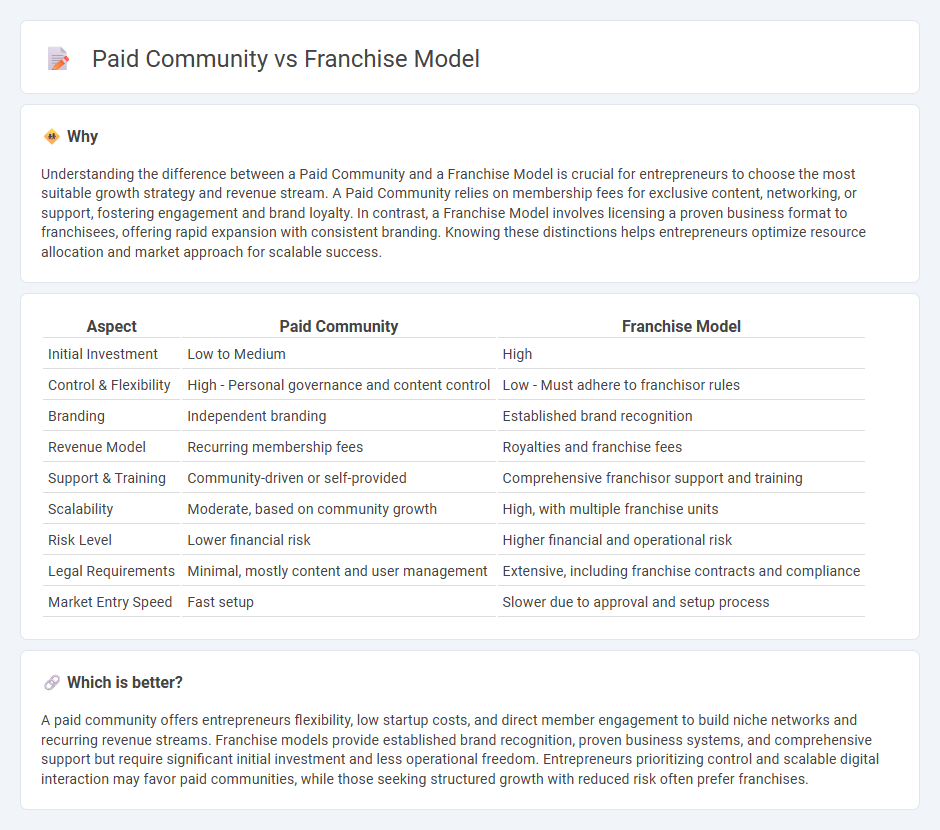
Paid communities foster entrepreneurship by offering access to exclusive knowledge, networking opportunities, and collaborative support, enabling members to grow businesses with flexible investments. Franchise models provide a structured pathway to entrepreneurship through established brand recognition, proven business systems, and ongoing franchisor support, often requiring significant initial capital. Explore the distinct advantages of each model to determine the best entrepreneurial route for your goals.
Why it is important
Understanding the difference between a Paid Community and a Franchise Model is crucial for entrepreneurs to choose the most suitable growth strategy and revenue stream. A Paid Community relies on membership fees for exclusive content, networking, or support, fostering engagement and brand loyalty. In contrast, a Franchise Model involves licensing a proven business format to franchisees, offering rapid expansion with consistent branding. Knowing these distinctions helps entrepreneurs optimize resource allocation and market approach for scalable success.
Comparison Table
| Aspect | Paid Community | Franchise Model |
|---|---|---|
| Initial Investment | Low to Medium | High |
| Control & Flexibility | High - Personal governance and content control | Low - Must adhere to franchisor rules |
| Branding | Independent branding | Established brand recognition |
| Revenue Model | Recurring membership fees | Royalties and franchise fees |
| Support & Training | Community-driven or self-provided | Comprehensive franchisor support and training |
| Scalability | Moderate, based on community growth | High, with multiple franchise units |
| Risk Level | Lower financial risk | Higher financial and operational risk |
| Legal Requirements | Minimal, mostly content and user management | Extensive, including franchise contracts and compliance |
| Market Entry Speed | Fast setup | Slower due to approval and setup process |
Which is better?
A paid community offers entrepreneurs flexibility, low startup costs, and direct member engagement to build niche networks and recurring revenue streams. Franchise models provide established brand recognition, proven business systems, and comprehensive support but require significant initial investment and less operational freedom. Entrepreneurs prioritizing control and scalable digital interaction may favor paid communities, while those seeking structured growth with reduced risk often prefer franchises.
Connection
Paid communities foster engaged networks of entrepreneurs who share resources, knowledge, and support, creating a vibrant ecosystem that enhances business growth. Franchise models leverage such communities by providing structured access to proven systems, brand recognition, and ongoing training, ensuring consistent quality and scalability. Together, paid communities and franchise models accelerate entrepreneurship by combining collaborative innovation with replicable business frameworks.
Key Terms
**Franchise Model:**
The franchise model offers a scalable business framework where franchisees operate under an established brand, leveraging proven systems and support to reduce risk and accelerate growth. It enables rapid market penetration with consistent quality, benefiting from centralized marketing, training, and ongoing operational assistance. Discover how the franchise model can transform your business landscape and unlock sustainable expansion.
Licensing
Franchise models involve licensing a proven business system to franchisees who operate under the franchisor's brand and guidelines, ensuring consistency and market presence through standardized processes. Paid communities often use licensing to grant access to exclusive content, tools, or events, fostering engagement without the operational control typical of franchises. Explore the distinct licensing benefits and restrictions to determine the best fit for your business growth strategy.
Royalty Fees
Franchise models typically charge ongoing royalty fees based on a percentage of gross sales, providing franchisors with a continuous revenue stream tied to franchisee performance. Paid communities, in contrast, often collect fixed or tiered membership fees without ongoing royalties, focusing on access and engagement rather than sales percentage. Explore in-depth comparisons of royalty fee structures and financial implications to determine the best business model for your goals.
Source and External Links
Types of Franchise Models Explained - The franchise model includes types such as product distribution, where franchisees sell franchisor products with autonomy, and manufacturing franchises, where franchisees make and distribute products under strict franchisor guidelines to ensure quality.
Types of Franchise Business Models - Franchise business models also vary structurally, with models like Company Owned Company Operated (COCO), Company Owned Franchise Operated (COFO), Franchise Owned Company Operated (FOCO), and Franchise Owned Franchise Operated (FOFO), defining ownership and operation responsibilities.
The Franchise Business Model: Everything You Need to Know - Franchising is a contractual relationship where a franchisor licenses its business format, brand, and intellectual property to a franchisee, who pays fees and royalties, with common types including business format, product, and manufacturing franchises.
 dowidth.com
dowidth.com